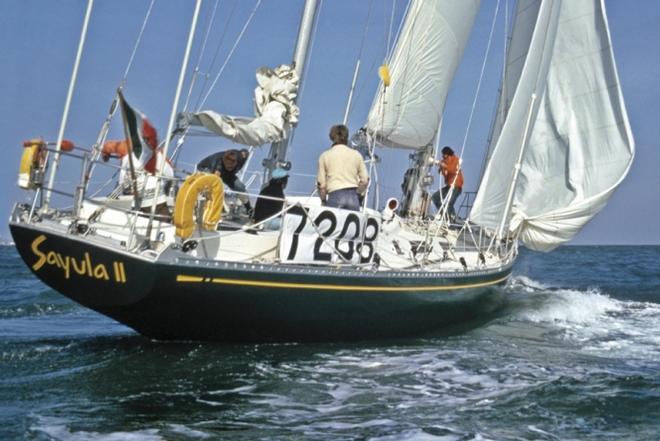Volvo Ocean Race - History delivers a wild ride
by Jon Bramley on 18 Oct 2015

Sayula II Barry Pickthall
It was two years ago this month that Bernardo Arsuaga walked into the Volvo Ocean Race museum.
The 38-year-old lawyer was walking around the '40 days, 40 faces' photography exhibition, when he noticed a picture of a middle-aged, bespectacled Mexican in a big sombrero celebrating with some obviously close buddies.
The photo, dating back to 1974, showed Ramon Carlin and his crew shortly after becoming the inaugural winners of the Whitbread Round the World Race, and it captured Bernardo's imagination.
He dashed back to his hotel in Alicante and immediately Googled Carlin, keen to read more of his countryman’s landmark success in the 1973-74 race.
“But there was very little – just a few articles that the race itself had published,” says Bernardo.
“Ramon was a very successful businessman but a private individual, not the kind to make much of his achievement.
“Mexico is a soccer nation and within a year, Ramon’s story had been forgotten in my country.”
And what a story it is. An against-the-odds tale of how the Mexican businessman beat a fleet of big-name European skippers despite his lack of experience in offshore racing.
Bernardo, who is a partner in a law firm in Monterray, Mexico, couldn’t get the story of how this comparative novice had won sailing’s inaugural premier round-the-world race out of his head.
“I returned home to Mexico and asked friends and family about Carlin. None had heard of him, yet what he’d achieved was amazing.'
'This is a man who had only sailed some 80 hours or so beating the sport’s biggest names of the time, like Chay Blyth and Eric Tabarly.'
Until the Whitbread Race, Carlin’s experience consisted of sailing his small sailboat in Acapulco for one weekend a month over two years plus a trans-Pacific crossing.
Bernardo continues. “I had always dreamt of one day making a documentary and this seemed a great, great subject. But I was despairing of how I could contact Ramon, who I knew would be a pretty old man by now - if he were still alive.
“Then I wrote to the Race and Christina Gaither, a great person who worked at the headquarters in Alicante, replied with an email address which didn’t give a name. I wrote to it and within two days a guy who turned out to be Ramon’s son, Enrique, wrote back, agreeing to meet me.”
Enrique lived just a few blocks from Bernardo in Monterrey and they chatted over plans for the documentary over breakfast.
Bernardo went on to meet Ramon Carlin himself, still sparky and lucid past his 92nd birthday, and organised the entire documentary project, including staging a reunion meeting for the surviving crew for the first time since their Whitbread triumph 40 years earlier.
“I hired the best production team I could find and we interviewed everybody that could help tell the story,” Bernardo smiles.
'With the support of my family, my partners and some great talented friends we started to make it possible.
“I wanted to make the film in a year but it has taken double that.
“It has taken up all my time outside my law practice – five, six, seven hours a day. I’ve given up weekends and often finished at 3 in the morning working on this thing.
“I came to hate vacations because that meant that the team wasn’t working on the film.
“I was responsible for everything – the production team, the hirings and the firings, hotel reservations, permits, lawyers, cameramen – you name it - until I went to Canada and found a great team that helped me finish the film.
“It’s been crazy, a wild ride. But it’s everything I’ve dreamed of.”
Bernardo even managed to persuade 1985 Whitbread Race competitor and pop superstar, Duran Duran's Simon Le Bon, to narrate the 75-minute documentary.
“We wrote to them and told them the story which they liked, especially Simon, an amazing artist and a great sailor who loves the race. I wanted an English voice and who better than Simon Le Bon?”
Bernardo continued: 'Our idea now that the production has been finalised, is to send the final cut to the film festival circuit for 2016. There are several film festivals in Spain and one in France already interested on the story.
“It’s not about the money we’ve spent on it. If we get back a good proportion of what we’ve spent then great.
“But this was a story that needed to be told properly and I’m just so glad that we’ve done that.”
If you want to link to this article then please use this URL: www.sail-world.com/139305